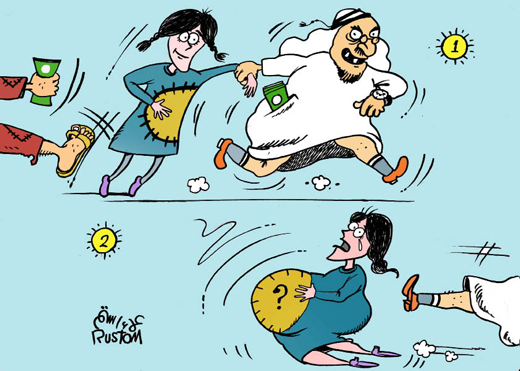Syrians in Saudi Arabia encounter numerous social barriers but the financial reward of emigrating there can be tempting.
Nothing could have prepared Mohammad Ghannam for what he witnessed at age 12. A drug dealer was beheaded in the courtyard of a mosque near his house in the Saudi Arabian capital of Riyadh. Ghannam, a 32-year-old Syrian who grew up in Saudi Arabia, said he could not sleep for days after the incident.
“Although executions are public, the Saudi authorities never inform people beforehand that a beheading will take place in the mosque. Since children in Saudi Arabia start going to mosques at age three, they often have to witness executions,” Ghannam explained. By the time he was 18, he said he had witnessed six beheadings, adding that they “become less shocking with time”.
Saudi Arabia is governed by a strict, Wahhabi interpretation of Sharia law and a conservative social code that prohibits interaction between the sexes. Thieves can have their hands cut off and adulterers can be stoned. Despite this stark reality, many young Syrian men move to the oil-rich country to save money to pay off the approximately SYP 300,000 (USD 6,500) fee for avoiding military service or to cope with the rising cost of living. Today, Saudi Arabia hosts 400,000 Syrian workers, thousands of whom are investors, he said.
With high unemployment back home, working in Saudi Arabia offers a better future for some young Syrians. Socially, however, life in Saudi Arabia can be stressful, Syrians living there told Syria Today.
“My job makes me financially comfortable, but, psychologically speaking, I am growing weary of it,” Moonzer al-Bitar, a Syrian who moved to Jeddah in 2007 to work for a medical company, said. The tradition of young Syrians travelling to Saudi Arabia for job opportunities goes back to the early 1930s, when oil was first discovered there. The country was developing rapidly and, with the lack of local expertise, it provided a job market for skilled workers from Syria, Lebanon, Palestine and Egypt – many of whom eventually settled there.
Strict upbringing
Ghannam’s family moved to Riyadh in 1979, when he was one month old. The severity of punishments there teaches obedience from a young age, according to Ghannam. Missing prayer can result in lashes to the feet or detention by the moral police. Approaching unrelated women in public can lead to three days in jail. Ghannam said that as a teenager, he never spoke to women outside his family.
“It was too risky,” he said.
Ghannam’s family moved back to Damascus in 2007. While today he leads a liberal life, he said his family still practices the conservative lifestyle they grew accustomed to back in Saudi Arabia.
Anoud Souhail, a Syrian English literature student at the University of Damascus who grew up in Saudi Arabia, said that Syrians in Saudi Arabia often assimilate to the local culture.
“Some Syrian families I know in Saudi Arabia reorganised their houses to have two sitting rooms – one for men and another for women,” Souhail said.
Limited outlets
Life in Saudi Arabia has some enjoyable aspects, too.
Syrians living in Saudi Arabia enjoyed access to modern technology and fashionable cars. Even today, Syrian expatriates often show off their high-tech purchases when they come from the Gulf to visit their relatives in Syria.
“I had my first computer when I was in fourth grade in Saudi. Back then, computers, mobiles and internet, among other things, were not available in Syria. I used to feel that Syria was way behind civilisation,” Ghannam said.
In addition to his access to gadgets, Ghannam had a few social activities in Saudia Arabia that brought him enjoyment. For example, he enjoyed attending hunting trips in the desert with his school.
“Saudi Arabians are experts at hunting,” Ghannam said. “We used to hunt for jerboas (a desert-dwelling rodent with long hind legs), dhubs (a type of spine-tailed lizards) and locusts.”
Entertainment possibilities remain otherwise limited in Saudi Arabia, according to Syrians living there. Bitar said foreign embassies sometimes organise cultural events worth attending. Other than that, segregated visits to the beach, cafés and restaurants are the only social outlets. Women’s activities are restricted to shopping and to visiting female friends in their homes and they are prohibited from taking public transportation.
“Most Saudi women have a car with a private driver to take them around,” Souhail said. “As for Syrian and other Arab families, they mostly moved to Saudi Arabia to save money and cannot afford such luxuries. With no car at hand, women can only take taxis in groups or accompanied by a male relative or family friend.”
Foreign discrimination
While at an official level, foreigners are treated as equal to Saudi Arabians, Souhail said foreign workers, including Syrians, feel discriminated against by the Saudi society.
“In general, Saudi people never fail to highlight that you, as a foreigner, are working for them and they treat you accordingly,” she said. “My teachers at school used to think I was Saudi because I come from the Mushawwah family which is also famous in Saudi Arabia. When they found out I was Syrian, they treated me differently and started giving me bad scores at school.”
Ghannam, however, pointed out that only poorer school children face discrimination.
“Syrians who could afford to study at private schools did not face this kind of discrimination,” he said. Nevertheless, even affluent Syrians never fully assimilate. “Saudis are very loyal to their community. If there is an argument, they always side with the Saudi against the foreigner, regardless of who was wrong.”
A policy issued in 1995 capped the number of foreign workers and also limited certain positions to Saudi Arabians.
“No matter how highly educated a Syrian is, he will never be promoted to a leading position in his company,” Souhail, the student in Damascus, asserted. But, she added, the high salaries mean she may return to Jeddah after graduating.
This article was published in Syria Today magazine.




